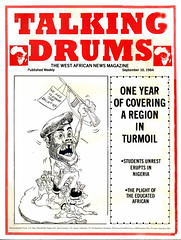Music And Arts Scene
African Records Review
By Kwabena Asamoah
SUPER BITON DU MALI: 'Baland zan' (TANGENT TAN LP 7008) Sodanso' 'S.T.I.'/'Waracoro' 'Kara Demba' 'Flani-N'Goni'.
The Republic of Mali in West Africa offers its music to British audiences and the world in general via Super Biton whose music stretches from ballads to Afro jazz depending on how you look at it.The richness of sounds emanating from the grooves on this album needs to be taken seriously. The music is not necessarily commercial but it has the authenticity which characterises that of most African bands, especially the many not known beyond their immediate periphery.
The instruments do not only harmonise appropriately but also complement the woolly voices (which sound like that of Alhaji Kollington Ayinla of Nigeria) in 'Sodanso'. The striking of the guitar, strong and infinitely appealing, registers melodies competent enough to attract your attention especially in 'Flani-N'Goni'. The strong bass line requires the bass drum which never fails to answer.
'S.T.I.' sounds like a fusion of reggae and calypso but has the authentic African drive, never easy to catch if you have no ears for similar sounds. Just before the keyboards strike an extraordinary length of solos in 'Waracoro', the sax riffs and the answer by the horns ensemble spell out a class worthy of notice by the listener.
Voices dominate in 'Kara Demba' but not for nothing. The harmonies and the vocal plays make beautiful music.
It is difficult to spot out the most outstanding track but 'Flani-N'Goni' sounds like the easiest to dance to if that is your objective. The guitar solos fascinate and reach the listener in an effective manner. The album would make a good part of your African collection.
MAITRE GAZONGA, L'INTERNATIONAL CHALLAL: 'Les Jaloux Saboteurs' (TANGENT TAN LP 7003) 'Les Jalous Saboteurs' 'Koysse'/'Fat- oumata Kanté' 'Kelina'.
A great number of Francophone artistes have recorded at the popular JBZ Studios in Abidjan, Ivory Coast and one of the newcomers is Hamed Gazonga who is probably from Chad.Beginning 'Les Jaloux Saboteurs' with an announcement in a humorous way, Gazonga recounts his problems in his slightly high-pitched voice: he encounters problems abroad - Zaire, Gabon, Cameroons and Central African Republic as a foreigner but returns home - Ndjamena in Chad - only to be persecuted by 'jealous saboteurs'. At the background of those moving words is an amalgam of music powerful enough to drive the listener to the dance floor. Sounding like the Zairean soukous, Maître Gazonga's music retains a certain peculiarity which runs through all the four tracks.
The combination of horns and the guitars in 'Koysse' has a stupefying effect on the ears. At the beginning will be a rhumba which later develops into a soukous founded on wailing sax and twanging guitars.
The style in 'Fatoumata Kanté' and 'Kelina' and indeed all the four tracks might sound similar and therefore runs the risk of being monotonous. But Maître Gazonga's choice of lyrics is interesting. 'Kelina' however, stands out differently. as the song develops. The guitar and sax solos have appeal and Maître Gazonga himself encourages the dancer with his invitation.
On balance, there is not much here to knock you mad except 'Les Jaloux Saboteurs' but lots of subtle individual qualities of the musicians gush out as you spin the album on your turntable.
